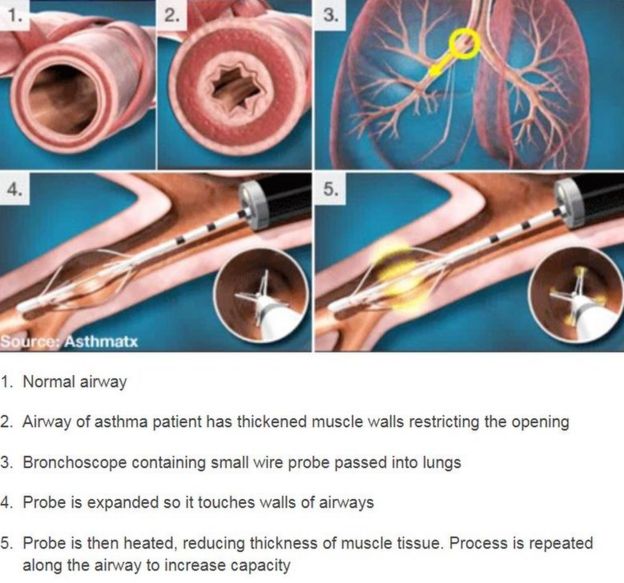A new treatment for severe asthma, is set for wider NHS distribution
A new treatment for severe asthma is set to be made more widely available on the NHS in the UK by the end of 2018. The procedure, bronchial thermoplasty, "melts" away excess muscle tissue in the lungs using radio frequency, making breathing easier. Previously there were strict criteria about who was eligible to receive it. But the National Institute for Health and Care Excellence (Nice) says it can be offered more routinely, after it was proved to be safe and effective. Some people may still not be able to receive it because the final decision about whether to offer the procedure lies with local health bodies.
Who could benefit?
Some 5.4 million people in the UK have asthma - but for more than 200,000 of them (3.7%) the asthma is so severe, it can be life-threatening. In fact, the most recent figures from Asthma UK show that 1,410 people died from asthma in 2016. However, this "life-changing" treatment will be used only if a patient's symptoms cannot be adequately controlled with drugs, and is only suitable for adults.
Joe Farrington-Douglas, the charity's head of policy and external affairs, said: "This debilitating form of asthma is resistant to regular treatments, meaning many have to cope with terrifying asthma symptoms, such as gasping for breath, as well repeated trips to Accident & Emergency. "Until now, this treatment has only been available for specific patients at some specialist centres, but these new guidelines could mean more people with the condition could reap the benefits."
Symptoms of asthma
-
Coughing
-
Wheezing
-
Shortness of breath
-
Chest tightness
They might only happen when you react to a trigger, like pollen, dust, cigarette smoke, cold air or pets.
Source: Asthma UK
How does it work?
Severe asthma causes inflammation and constriction of the smooth muscle in the walls of the small tubes - the bronchi - impeding the passage of air through to the deep tissue of the lungs. Bronchial thermoplasty tackles this by reducing this muscle mass, thus decreasing the constriction of the bronchi that can take place during an asthma attack. As a result, patients experience fewer and less severe asthma attacks. The procedure takes place under sedation or general anaesthetic and involves a wire probe being inserted into the lungs.
 Image copyright Asthmatx/BBC
Image copyright Asthmatx/BBC
Image caption Diagram of bronchial thermoplasty
Ten-second bursts of radio waves are sent along the airway wall, heating the lining of the lungs to 65C. Two further sessions will be needed, each three weeks apart.
The estimated cost of the procedure per patient is thought to be between £7,099 and £7,257. Nice's programme director and clinical adviser, Prof Kevin Harris, said: "This is a procedure which is innovative and it does work. Asthma is a common disease and the vast majority of patients won't require this treatment. But for people with severe asthma this procedure could be life-changing. The committee was convinced it was safe enough and works well enough for use with standard arrangements in the NHS."
